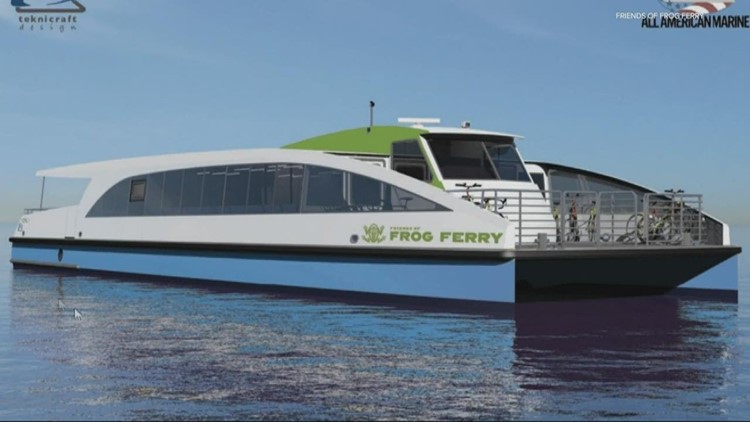PORTLAND, Ore. — A years-long effort to add ferry service to Portland's list of transportation options through a public-private partnership missed a key deadline this week, all but ensuring that the Frog Ferry won't be launching anytime soon, if ever.
Frog Ferry founder Susan Bladholm and board chair James Paulson put out a statement Tuesday, acknowledging that they'd missed the deadline to apply for a Federal Transportation Administration grant that would allowed the project to get off the ground.
"This year, the federal government has made an unprecedented nearly $300 million available for ferry systems nationwide as part of the Infrastructure Investment and Jobs Act," Bladholm and Paulson said. "After five years, we do not have a public agency willing to step up and partner with us (which is required for most public funding requests), to work with us on the development of the docks, or to ensure our planning is integrated into earthquake resilience planning and regional project plans."
RELATED: TriMet gets ready to launch FX2-Division bus line, running between downtown Portland and Gresham
The Frog Ferry proposal aimed to have a 70-person ferry operate between Cathedral Park in St. Johns and RiverPlace in downtown Portland. Proponents of the project billed it as a cheap and relatively green option for making the trip, with the potential for fully electric ferries down the road.
A pilot version of the program was originally supposed to begin by this year, which was later pushed to 2023. It received a test run in Oct. 2021 — though the pilot boats used were not examples of the proposed ferry vessel, which has yet to be built.
Frog Ferry figuratively ran aground in April when Portland city commissioners voted down $225,000 in emergency funding for the project.
But the city funding was just the tip of the iceberg — below it lurked ongoing acrimony between Frog Ferry's leaders and TriMet, the source of a major grant. The tri-county transportation agency accused Frog Ferry of inappropriate spending and billing practices, while Frog Ferry claimed that TriMet was simply unwilling to share space with a private operator.
Frog Ferry's request to the city for funding stemmed from TriMet's unwillingness to pump further grant funds into the project. With a denial from Portland City Council, the Frog Ferry project effectively went dormant.
According to a newsletter sent to Frog Ferry stakeholders this week, the nonprofit previously tried for an FTA grant in 2021 but was denied due to a lack of sufficient oversight from the city of Portland. This year, Frog Ferry tried unsuccessfully to have the city support the project by both administrative and financial means.
"It will be another full year before those funds are eligible for Oregon again," the nonprofit said.
In their statement, Bladholm and Paulson asserted that ferries are a "best practice" for river cities, one that would improve livability and help curb carbon emissions. They said that they remained proud of their accomplishments over the past five years, adding that the quality and rigor of their nonprofit's work has always received high praise.
"We essentially have a solution ready to help address the climate and livability needs for our region we hear about every day – we would have been able to put a boat on the water within 18 months," they said. "But this is the bottom line: We can’t make a public-private ferry operation without a 'public' agency being involved in a meaningful way. We will not be able to do so until our city leaders also make it a priority."
Frog Ferry's newsletter entertained the idea of a fully private ferry service instead of a public-private partnership — and barring a fully public option that seems unlikely to materialize — though there was no indication of concrete plans for pursuing this route. The nonprofit continues to accept donations and advocate for the existing proposal.



